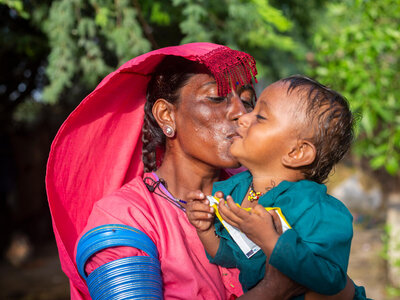Pakistan
- 20.7%
- of the population is undernourished
- 40%
- of children under 5 are stunted
- 241 million
- population
Despite progress, the nutrition and hunger situation remain serious in Pakistan, with a ranking of 109th out of 127 countries in the 2024 Global Hunger Index.
Pakistan is currently ranked as the 8th most vulnerable country to the impact of climate change, as seen during unprecedented floods in 2022. It struggles with high multidimensional poverty. Nearly half of an average household’s monthly expenditure goes towards food and 82 percent of the population cannot afford a healthy diet.
What the World Food Programme is doing in Pakistan
-
Nutrition
-
WFP continues to improve nutrition through policy and governance support, advocacy, nutrition programmes, fortification, evidence generation and innovation. WFP is partnering with the Benazir Income Support Programme to implement the Benazir Nashonuma Programme – a national stunting prevention programme that targets pregnant and breastfeeding women and children under 2 from the poorest households in the country. WFP also partners with some provincial Governments to pilot school-based programmes, treats acute malnutrition, and works with 150 small-scale wheat millers across key parts of the country to produce fortified wheat flour for their customers.
-
Resilience building
-
WFP builds resilience by providing cash and food assistance, for communities’ participation in restoring and building community assets that enhance food security and livelihoods, and lessen the impact of floods and droughts. Projects include water systems, irrigation, feeder roads, bridle paths and climate-resilient infrastructure like flood-protection walls, culverts and bridges. WFP also empowers women through training in enterprise development, budgeting, and income-generating activities such as poultry farming, kitchen gardening and handicraft – including building market links to sell products online.
-
Sustainable food systems
-
WFP works with the Government to strengthen the sustainability of national food systems and enhance adaptability to climate shocks, through policy support and innovative solutions. WFP is advocating for the mandatory fortification of wheat, oil and salt, to increase access to vital micronutrients. A ‘wheat fortification solution, through Chakkis (small-scale mills), is being explored to meet the needs of the 70 percent of Pakistan's population that relies on locally milled wheat flour. WFP routinely fortifies wheat flour used in its emergency and relief programmes in the country. WFP also advocates to reduce post-harvest losses and improve efficiency in public distribution.
-
Disaster preparedness and response
-
WFP supports the Government by providing humanitarian and recovery assistance to meet the basic food and nutrition needs of the most vulnerable populations, both before, during and in the aftermath of disasters. As the Government is taking over responsibility for responding to emergencies, WFP is working with Disaster Management Authorities at all levels. We are strengthening their capacity in preparedness, mitigation and response, with a focus on developing anticipatory action protocols and capacities in view of Pakistan’s growing vulnerability to recurring climate-driven shocks. WFP Pakistan also provides humanitarian support for the Afghanistan operation, by handling food commodities as part of humanitarian assistance operations, including procurement.
Pakistan news releases
Go to pagePartners and donors
Achieving Zero Hunger is the work of many. Our work in Pakistan is made possible by the support and collaboration of our partners and donors, including:
View all
Find out more about the state of food security in Pakistan
Visit the food security analysis pageOperations in Pakistan
Contacts
Office
Plot no. 1, Diplomatic Enclave No 1, Sector G-5, Islamabad.
Islamabad
Pakistan
Phone
+92-51-8312000
Fax
+92-51-8438251






